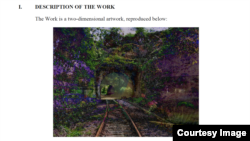The American agency responsible for issuing copyright protections has rejected a request to register an image created by a machine.
The request, to the U.S. Copyright Office, was made by Stephen Thaler, a scientist and developer of neural networks. A neural network is a computer system built to simulate, or act like, the human brain.
Thaler built an artificial intelligence (AI) powered system called the “Creativity Machine.” The system produced a colorful, painting-like image with the help of an algorithm processed by a computer.
Thaler named the image “A Recent Entrance to Paradise.” He said it was meant to represent the AI system’s visual creation of a simulated near-death experience.
Thaler first sought a copyright registration for the digital image in 2018. That request was denied in 2019. So, he asked the agency to reconsider that decision. In a new ruling last week, the Copyright Office upheld its first rejection.
The agency explained the reasoning for its decision in a letter to Thaler’s legal team.
In the document, the Copyright Office states that Thaler described the image as being “autonomously created by a computer algorithm running on a machine.” In other words, he believes his AI system created the digital artwork completely on its own, without help from humans.
The agency said the request sought to register the computer-produced image “as a work-for-hire to the owner of the Creativity Machine.” Thaler listed himself as the owner of the machine.
In its latest ruling, the Copyright Office explained that it was once again rejecting the registration request. It said it had taken the action because the image “lacked the required human authorship” required to receive copyright protection.
In seeking a reconsideration of his request, Thaler argued that the agency’s human authorship requirement is unconstitutional and not supported by case law. The Copyright Office rejected that argument.
It said it had accepted Thaler’s description that the image he sought to register was created without any human involvement. Current rules state that the Copyright Office must refuse a registration “if it determines that a human being did not create the work,” the agency said.
The Copyright Office added that Thaler’s request was not effectively supported by current U.S. law or decisions in past copyright-related cases. It noted that the request appeared to be more of “a policy argument in favor of legal protection for works produced solely by artificial intelligence.”
The continued development of AI systems built to assist humans is likely to lead to new debates over whether current laws relating to copyrights and patents should be changed.
In 2020, Thaler sought patents for two products he claimed were completely created by an AI system he calls DABUS. The U.S. Patent and Trademark Office also rejected those requests, The Verge website reported. That agency said it denied the requests because under current patent laws, “a machine does not qualify as an inventor.”
Thaler also sought approval for the products with patent agencies in Britain and Europe, but those requests were also denied. However, a judge in Australia ruled last year that inventions created by AI systems can qualify for patent protection, Engadget reports.
A legal representative for Thaler, Ryan Abbott, said in an online discussion about the issue that he has not argued that AI should own actual patents. Rather, a patent should be held by the owner of the system or machine that did the inventing. However, Abbott said he and Thaler do believe that governments should recognize the machine as the inventor or creator. He said this could prevent “people from claiming credit for work they haven’t done.”
I’m Bryan Lynn.
Bryan Lynn wrote this story for VOA Learning English, based on reports from the U.S. Copyright Office and online sources.
We want to hear from you. Write to us in the Comments section, and visit our Facebook page.
_____________________________________________________________
Words in This Story
copyright – n. the legal right to be the only one to reproduce, publish, and sell a book, musical recording, etc., for a certain period of time
artificial intelligence – n. the development of computer systems with the ability to perform work that normally requires human intelligence
algorithm – n. a set of steps that are followed in order to solve a mathematical problem or to complete a computer process
visual – adj. related to seeing
autonomous – adj. independent and having the power to operate automatically without human involvement
author – n. someone who writes a book, article, etc.
sole – adj. only
patent – n. an official document that gives a person or company the right to be the only one that makes or sells a product for a certain period of time
qualify – v. to be permitted to do or have something






